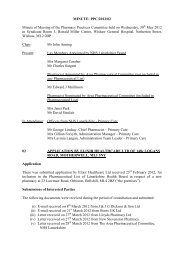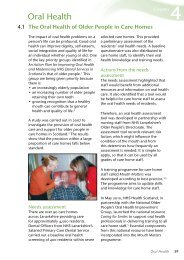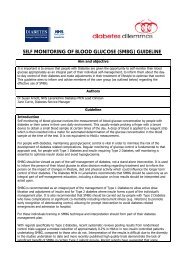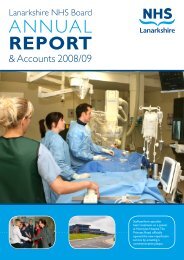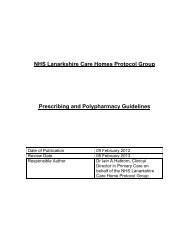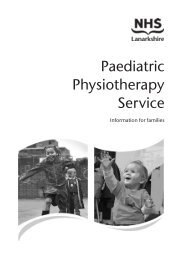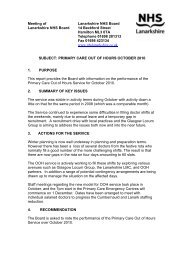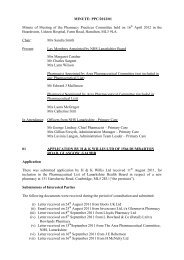Palliative Care Guidelines - NHS Lanarkshire
Palliative Care Guidelines - NHS Lanarkshire
Palliative Care Guidelines - NHS Lanarkshire
- No tags were found...
You also want an ePaper? Increase the reach of your titles
YUMPU automatically turns print PDFs into web optimized ePapers that Google loves.
<strong>Palliative</strong> <strong>Care</strong> <strong>Guidelines</strong>: Bowel ObstructionBowel Obstruction in <strong>Palliative</strong> <strong>Care</strong>IntroductionIs due to mechanical obstruction (partial or complete) of the bowel lumen and/or peristaltic failure.Can be complex to manage and require specialist advice.Assessment• Exclude faecal impaction from history, rectal examination, abdominal X-ray. Can complicate ormimic any type of bowel obstruction.• Some patients with a localised obstruction can benefit from surgery.• Assess each patient on the basis of their clinical condition, likely benefits/ risks and patientpreferences.Contraindications to surgery• Diffuse intra-abdominal cancer seen at previous surgery, or shown radiologically.• Diffuse, palpable intra-abdominal masses.• Massive ascites which recurs rapidly after drainage.• High obstruction involving the proximal stomach.Relative contraindications to surgery• Non-symptomatic but extensive metastatic disease outside the abdomen.• Frail or elderly patient with poor performance status or nutritional status.• Previous radiotherapy to the abdomen or pelvis.• Small bowel obstruction at multiple sites.Clinical pictureDepends on the level, type and duration of bowel obstruction but may include:• Constipation.• Intermittent nausea, often relieved by vomiting undigested food.• Worsening nausea and/ or faeculent vomiting (as obstruction progresses and small bowelcontents are colonised by colonic bacteria).• Continuous abdominal pain due to tumour and/ or nerve infiltration (eg. coeliac plexusinvolvement).• Colic (in mechanical obstruction); altered bowel sounds.• Abdominal distension (may be absent in gastro-duodenal obstruction or patients with extensiveperitoneal spread).• Faecal incontinence.ManagementGeneral• Frequent mouth care is essential (see: Mouth <strong>Care</strong>).• Offer ice to suck, small amounts of food and drinks as wanted. Low fibre diet.• If the patient is dehydrated and not dying, IV rehydration may be appropriate initially.• SC fluids may be required for longer-term management of symptomatic dehydration or for apatient not wanting hospital admission. Hydration of 1-1.5 litres/ 24hours may reduce nauseabut more fluid than this can result in increased bowel secretions and worsen vomiting.(see: Subcutaneous fluids).• Laxatives +/- rectal treatment for constipation. (see: Constipation).Interventional treatment• Stenting (gastric outlet, proximal small bowel, colon) or laser treatment can palliate localisedobstruction.• NG tube may be appropriate to control vomiting initially; try to avoid long-term use.• Venting gastrostomy in a fit patient with gastroduodenal or jejunal obstruction and persistentvomiting may relieve symptoms.• TPN is only appropriate for a very small group of patients with a longer prognosis.© <strong>NHS</strong> Lothian Issue date: January 2009 Review date: March 20121




